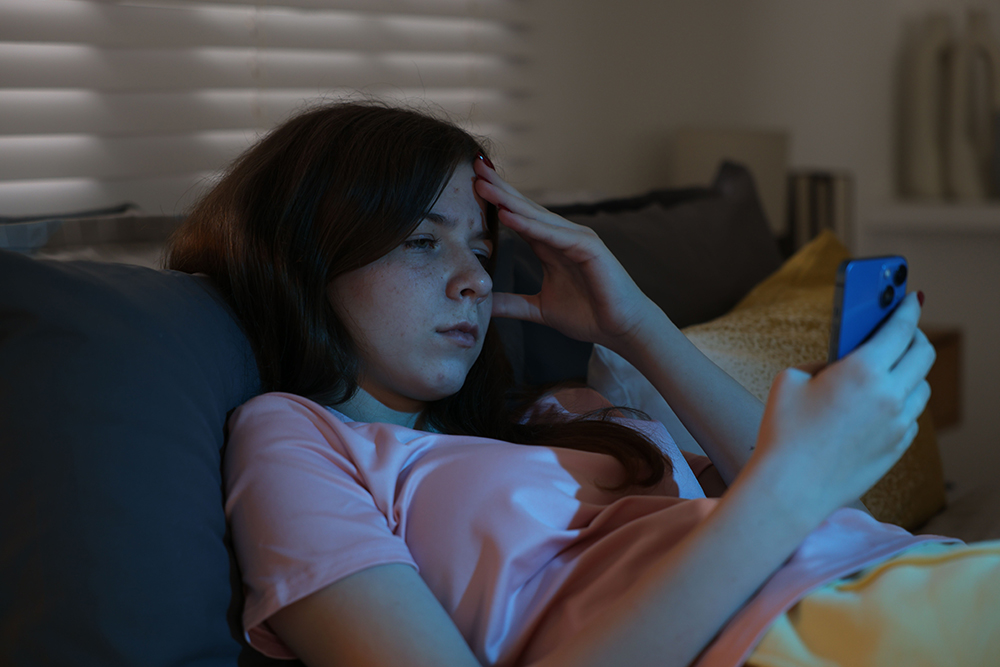National Depression Screening Day on Oct. 9 is a powerful reminder of how many people silently struggle with their mental well-being. For some, the hardest part of the day comes at night. Feelings of sadness, hopelessness, or emptiness can become more intense when the world grows quiet and distractions fade. This experience – often referred to as nighttime depression – is common, but that doesn’t make it easier to deal with.
Why Depression Can Feel Worse at Night
Depression often follows cyclical patterns influenced by biological, emotional, and behavioral factors. At night, several factors can intensify your depressive feelings.
- Fewer distractions: Work and family responsibilities keep your mind occupied during the day. Your thoughts may turn inward once things slow down, intensifying negative emotions.
- Fatigue: Having depression can be exhausting. By nighttime, you’ve already depleted your mental energy, leaving you dysregulated and more vulnerable to hopeless or self-critical thoughts.
- Hormonal and neurological changes: Natural changes in your body’s circadian rhythm can impact mood regulation. Some people experience dips in their serotonin levels at night, worsening symptoms.
- Sleep problems: Insomnia overlaps with clinical depression for many people. The frustration of multiple sleepless nights in a row can amplify your feelings of sadness.
What You Can Do About Nighttime Depression
If your depressive symptoms worsen at night, try these tips to combat them.
- Create a calming nighttime routine: Dim the lights, reduce screen time, and engage in relaxing activities like reading, stretching, or gentle breathing exercises.
- Challenge negativity: When rumination starts, reframe your thoughts instead of letting them spiral. You can try repeating positive affirmations or writing down unhelpful ideas and physically letting them go.
- Use guided relaxation or self-hypnosis: Techniques that promote relaxation and mindfulness can quiet your mind and prepare you for rest.
- Seek connection: Even sending a quick text or reaching out to a trusted friend can help you feel less alone.
- Ask for professional help: See a health provider if you regularly feel hopeless, experience insomnia or think about ending your life.
Why Hypnotherapy Is Beneficial for Depression
At Achieve Health Center, I use hypnotherapy as a holistic approach to help clients manage depression. Hypnosis allows us to access your subconscious mind – the part where emotional patterns, beliefs, and memories live. In this calm, focused state, we can gently reprogram negative self-talk, release emotional tension, and introduce new, empowering thought patterns.
Hypnotherapy can help you:
- Reduce nighttime anxiety and racing thoughts
- Improve sleep quality and relaxation
- Reconnect with your inner peace and sense of purpose
- Build emotional resilience
Many of my clients say hypnotherapy helps them feel lighter, calmer, and more in control of their emotions – even when other treatments haven’t provided relief.
The Importance of Getting a Depression Screening
If you suspect you may have depression, getting a professional screening can be life-changing. An official diagnosis will help you understand what’s happening in your mind and body, thus paving the way to an effective resolution.
A depression screening can:
- Identify whether your symptoms meet the criteria for clinical depression
- Rule out other causes, such as hormonal imbalances or medical conditions
- Guide you toward evidence-based treatments like therapy, hypnotherapy, or medication
I’m here to help if you’re ready to explore holistic healing and rediscover your inner calm and balance. Together, we can work toward creating more peaceful nights and brighter mornings.

